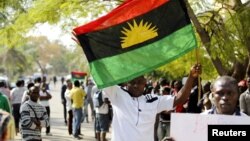Amnesty International says Nigerian soldiers killed at least 17 people during a recent gathering of Biafran separatists in the country’s southeast. The military is denying the allegations.
Supporters of the Indigenous People of Biafra gathered in the city of Onitsha and surrounding communities late last month to commemorate the date when southeastern Nigeria seceded and became the short-lived Republic of Biafra.
IPOB, as the group is known, was planning a march to mark the anniversary. Amnesty International says the night before the event, the military raided a church where Biafra supporters were sleeping. Soldiers allegedly fired tear gas and live bullets at hundreds of people, killing at least one person.
The following day, Amnesty says soldiers shot people gathered at a bus station and also fired on protesters blocking a junction in Onitsha, killing a bystander.
Makmid Kamara, project coordinator for Amnesty International, says the shooting victims were unarmed.
“We think these shootings amount to extrajudicial killings and a lot of the shootings were indiscriminate,” said Kamara.
Army denies report
Nigeria’s army denied the Amnesty report. In a statement, it said members of IPOB engaged in “violent protests” that killed two police officers and wounded soldiers.
IPOB said at least 50 of its members were killed in the incident. Amnesty said it can only confirm the deaths of 17, but that they believe the bodies of those killed were taken somewhere by the military.
Agitation by separatists in Nigeria’s southeast has been on the rise in recent months. The arrest of IPOB leader Nnamdi Kanu last October further inflamed tensions. In February, two people were killed during a protest in the southeastern city of Aba.
Nigeria’s military has come under fire from human rights groups for other incidents as well. A year ago, Amnesty International accused the military of killing thousands suspected of ties with Boko Haram insurgents in the northeast.
Human Rights Watch criticized the army in December for killing hundreds of members of a Shi'ite sect in the northern city of Zaria.
Nigeria’s military has generally denied these charges, saying their soldiers respect lives and property.
Kamara said the recent incidences show that rule of law is eroding in Nigeria.
“In the case of the IPOB, or the pro-Biafra supporters, we are extremely worried that the heavy-handedness of the Nigerian military force is leading to increased level of impunity,” said Kamara.
The report says many of those killed and injured are still being held by the military.




